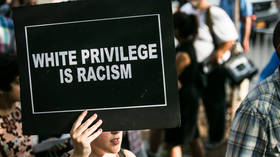Dear white people, don’t listen to articles using these words. All these race-based instructions are infantile & patronising

“Check your privilege... Know your place… Support black leaders” are just some of the condescending missives directed at “fragile” white people, who apparently need to be taught what’s required of them in the new racial etiquette.
I have stopped counting the numerous “Dear White People” messages being churned out by a new cohort of professional race entrepreneurs aiming to guilt-trip their target audience.
“Dear White People, Please Read ‘White Fragility’,” instructs The Washington Post. In case you don’t get the message, The New York Times, helpfully reminds its stupid white readers, “Dear White People: Being an Ally Isn’t Always What You Think.” Fortune – a magazine that usually deals with the affairs of big business – also piles in with its words of wisdom: “Dear White People, The Work Takes Time.”
Not to be outdone, the usually frivolous Glamour Magazine assumes the grave persona of a Sunday School Preacher and warns: “White people, here’s how we can try to be better allies and proactively anti-racist.” And just to show that new-fangled American theology has also absorbed the condescending “Dear White People” mantra, Evangelicals for Social Action are ready to remind the world: “Dear White People: Being an Ally Is More Than a Performance.”
As you would expect, the banal rhetoric of “Dear White People” is now institutionalised in higher education. The website of the prestigious Imperial College of London, has a page called “How To Be A White Ally.” Its main message to dear white people is “Acknowledge your Privilege.” That’s another way of saying confess your sin, which is symbolised by your skin tone.
The University of Nevada leaves little to chance. It offers dear white people a 10-point plan that will help “white allies” to redeem themselves. Most of the guidance is devoted to explaining that dear white people should know their place, which is at the bottom of a newly constructed racial hierarchy. To realise this objective, it embraces a version of a Maoist self-critical struggle ritual and states “When Criticized or Called Out, Allies Listen, Apologize, Act Accountability, and Act Differently.”
Most of the guidance directed at dear white people is ostensibly directed at turning individuals possessing “privilege” into allies. Historically, the struggle against racism demanded solidarity from people of all races. Sadly, things have changed and the language of solidarity has been replaced by a quasi-religious rhetoric of acknowledging your guilt.
Also on rt.com Purple Lives Matter? Kristen Bell children’s book preaching tolerance savaged for ‘colorblindness’ & ignoring real racismDear White People are not invited to work as equal participants in the struggle against racism. They are instructed to know their place. “Our anger isn’t yours. It doesn’t belong to you,” notes a memo to would-be allies. One toolkit, titled “Guidelines for Being Strong White Allies” insists, “Support the leadership of people of color.”
Without a hint of irony, a manual that instructs dear white people how to behave on demonstrations is titled, “Proper Protest Etiquette for Allies.” And as you would expect, its rule number one is, “Know Your Place.” It explains:
“Before you show up to your first protest, it’s important to know and recognize your place. You are going into someone else’s home, so it’s vital that you check your privilege at the door before barreling up the stairs.”
The exhortation to know your place is usually combined with the call to “Listen To Black Leaders” and to behave as you are told. Anyone familiar with 19th century Victorian manuals produced for servants will be struck with its similarity in tone with contemporary dear white people literature.
The Dear White People narrative assumes that its audience are composed of infantilised and disoriented adults who are clearly morally inferior to its authors. The use of the term Dear, that prefixes white people expresses the attitude of barely disguised irritation and contempt. Its scolding air signals the expectation that allies are expected to crawl abjectly on the ground with their faces downwards.
It is worth noting that a lot of the Dear White People communiques are written by white people rather than black authors. In numerous schools and universities, white race entrepreneurs insist that studying the book White Fragility is more or less mandatory. This cohort of “super allies” have assumed that they have the moral authority to impose their views on their moral inferiors.
Unfortunately, whatever their intention, these race entrepreneurs are complicit in racializing everything. Their programme of race humiliation will do nothing to undermine real racism. Worse still, by attempting to re-create a “fairer” form of racial hierarchy they undermine the possibility of genuine solidarity.
Frank Furedi’s Why Borders Matter: Why Humanity Must Relearn The Art of Drawing Borders is published by Routledge on 13 July.
Think your friends would be interested? Share this story!
The statements, views and opinions expressed in this column are solely those of the author and do not necessarily represent those of RT.















